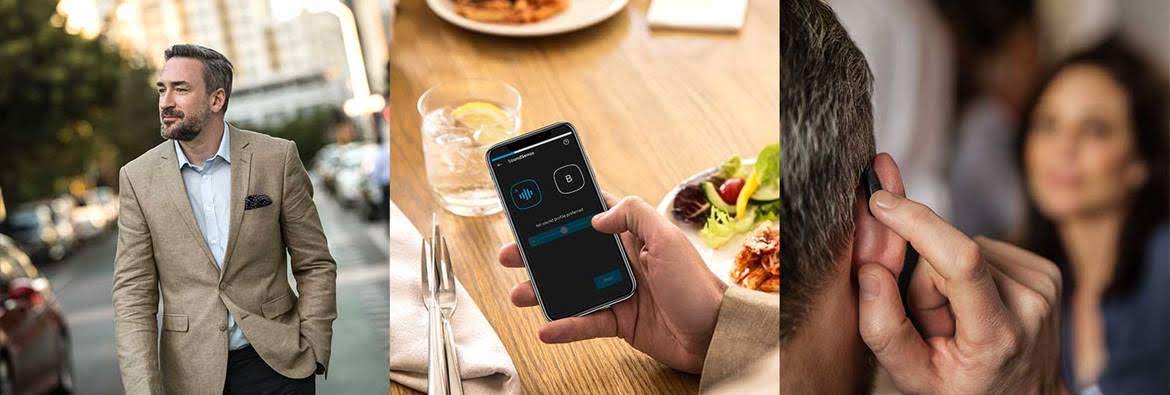Making hearing aids continuously improve
With the recent launch of the Widex Evoke, we have moved into new territory for hearing aids. In the article hearing aid innovations that change everything, I detailed machine learning as one of the features that will change everything for hearing aids as we move forward. But why do I think so you may ask and what difference can it make? I don't think I am too unrealistic in saying that it could change not just your experience with hearing aids, but also your experience with hearing professionals dramatically and forever. Let's take a look at why.

The Age Old Fine Tuning Problem
Its the age old fine-tuning problem, you go and see your hearing professional and try to explain the issues that you had in a particular sound environment. They then make changes to the programming of your hearing aids. Unfortunately, those changes are made in quiet rooms in clinics and you don't know what the effect will be until you are back in the situation. So starts a back and forth system until one of two things happen, the hearing professional gets it right, or you give up.
We have been aware of this problem for many years and in recent times some of the hearing aid brands have introduced telehealth features to begin to tackle the issue. But what if you made your own changes in real time? What if those changes were then used as the basis of better programming for not just your hearing aids, but everyones? Meet machine learning.
Using Massive Computer Power To Crunch Numbers
In essence, machine learning is a part of the greater artificial intelligence movement in computers. Large amounts of data are processed to in order that a management system can learn from the data. Machine learning and other artificial intelligence strategies have been used in healthcare for several years, but never before in hearing aids. The direct connection of hearing aids to a Smartphone (which we can thank GN Resound for) is what has made it possible.
In the case of the Widex Evoke, the machine will be learning the preferences of hearing aid users in different sound situations. This will allow the machine to make better judgements on what hearing aids should do in complex sound situations. Hopefully, it will be learning the preferences of thousands of hearing aid users, with luck in the future, it will be hundreds of thousands.
The issue with machine learning is that in order for it to be successful, it needs large volumes of data points to crunch through. Without that data, both its learnings and effects are limited at best. If Widex can convince users to become involved with the machine learning feature, those users will be rewarded with hearing aids that continuously evolve to be better at what they do. In other words, their hearing aids will continuously be upgraded to be better at what they do based on real-world data.
Designing Simple
Widex seems to have taken pains to design the user part of the function to be simple. This is really important because if it is difficult to use, users just won't use it. Widex offer a very simple A/B choice structure, does A profile sound better in this situation or B profile? The user picks and the data is stored and sent to the cloud via the Smartphone app. It is important for me to point out here that the data is anonymised, so you don't have any privacy worries with this type of system.
A Limited System Loop
At present, the data will be used to understand how the hearing aids may better perform in different sound situations. That understanding will be used to change the underlying strategies in the hearing aids with firmware upgrades that will be pushed out by Widex through the Evoke app. In this way, the system is a limited loop, however, as machine learning evolves, I think you can expect to see changes happening in real time.
Evolution of Machine Learning in Hearing Aids
I believe that as machine learning is adopted across hearing aid manufacturers, we will see an evolution in its function. We will see always on continuous data exchange between the hearing aids and the cloud server system. This will lead to higher functionality in hearing aids than ever before. Hearing aids of the future will continuously improve as more people use them in more situations.
This will be dependent on users having access to wider fine-tuning protocols on their Smartphone apps and acceptance of greater complexity. Again, back to the data needed, more data points means better learning and decisions. I think the user of the middle future will happily accept that though, in fact, I think the customer of five years hence may well demand it.
Changing The Relationship With Professionals
What will it mean for your relationship with hearing professionals though? If hearing aids are going to continuously be fine-tuned in your ear, what will you need to see your hearing professional for? Initially, I don't think this technology will have any effect on the current journey. However, as the technology evolves and uptake by users increases, I think the reasons that you see your professional will change.
When the full evolution of machine learning is complete, I think the only reasons you will attend your professional will be purely service based. Basically to check the function of the hearing aid, to check your ability to hear and to validate or verify that the hearing aid is delivering the speech signal you need. I think that this is five or more years away, but the technology will change things.
Changing The Business Model?
Will it change the business model of hearing aid delivery? I think it may, I think there will continue to be a hearing healthcare professional involved to test your hearing and give you recommendations on hearing solutions that are ideal for you and your lifestyle. Will they sell and fit those hearing aid solutions? Yes, no maybe, I think there will be different options and the answer to those questions will be based on the preference of the user.
In essence, I think that as technology evolves the business model will change, I believe it to be inevitable. Based on my experience with hearing aid advocates across the world, I do believe that my profession will continue to be involved with hearing aids and the people who wear them. Even the most ardent supporter of self-fitting and access to fine-tuning has always wanted the continued involvement of a professional.
What shape that involvement will take remains to be seen though, and I think it will be governed by the changing shape of the technology.
If you like what you see, share it so others can benefit
Posted by Geoff

Geoffrey Cooling





Geoffrey (Geoff, anything else makes him nervous) Cooling is an Irish hearing aid blogger and has been involved with the hearing aid industry for over ten years. He has worked in private practice dispensing hearing aids and as a manufacturer's rep. He has written two books and they are both available on Amazon. He loves technology, passing on knowledge and is legendary for many other things, primarily the amount he curses, his dry and mischievous sense of humour and his complete intolerance of people who are full of themselves. Please feel free to connect with him
Looking For the Latest Hearing Aids or A Hearing Test?
Arrange a consultation with a trusted Independent hearing healthcare professional in your area



